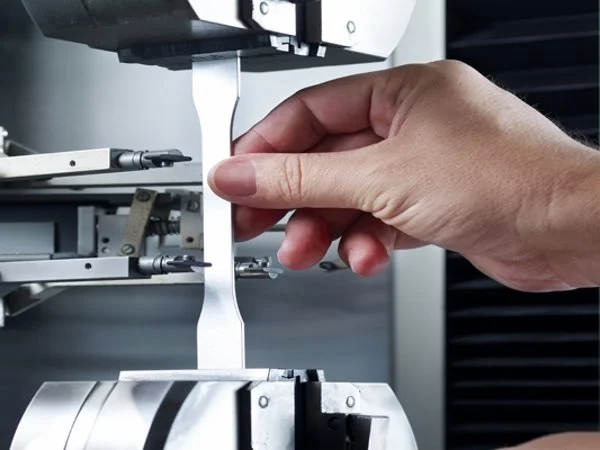GOST 6996 Weld Mechanical Property Test
The GOST 6996 standard specifies the method of determining the mechanical properties of welded joints. This test is crucial in ensuring the structural integrity and reliability of welded components used in various industrial applications, particularly within the oil and gas sector where safety and performance are paramount.
Welded joints form an integral part of pipelines, storage tanks, and other critical structures. The GOST 6996 test evaluates the mechanical properties such as tensile strength, elongation at break, and reduction in area by subjecting a weld coupon to standardised testing procedures. This ensures that all welded components meet stringent quality standards.
The test involves preparing a weld specimen according to specified dimensions and geometries outlined in GOST 6996. The specimen is then subjected to tensile testing, where it is pulled until fracture. The mechanical properties are calculated based on the load at yield, maximum load, and post-fracture elongation.
The accuracy of these tests is paramount, as even minor deviations can lead to safety hazards or operational failures in critical infrastructure. This test provides a robust method for assessing weld quality, ensuring that only materials meeting stringent criteria are used in manufacturing processes.
In the context of oil and gas testing, the GOST 6996 test ensures compliance with international standards while also adhering to local regulations. It supports industries where reliability and safety are non-negotiables. This test is particularly important for sectors that handle hazardous materials or operate in extreme environmental conditions.
The methodology used in this test aligns closely with other international standards such as ISO 14572, which also addresses the mechanical properties of welded joints. By adhering to these standards, industries can ensure consistent and reliable quality across different regions and manufacturers.
Understanding the specifics of GOST 6996 is crucial for quality managers, compliance officers, R&D engineers, and procurement specialists who are involved in materials selection and quality assurance processes. This test not only ensures that welded components meet strict mechanical property requirements but also contributes to the overall safety and longevity of installations.
In summary, the GOST 6996 test is a vital tool for ensuring the reliability and structural integrity of welded joints used in critical applications within the oil and gas sector. By adhering to this standard, industries can ensure that their materials meet stringent quality criteria, thereby enhancing operational safety and performance.
Why It Matters
The GOST 6996 Weld Mechanical Property Test is essential for several reasons within the oil and gas sector. Firstly, it ensures that all welded components used in critical infrastructure are of high quality and reliability. This test helps prevent potential failures that could lead to significant downtime or even safety hazards.
Secondly, compliance with GOST 6996 standards is crucial for meeting regulatory requirements and international benchmarks. It provides a consistent method for evaluating weld properties, ensuring uniformity across different regions and manufacturers.
Thirdly, the test supports research and development efforts by providing reliable data on weld performance under various conditions. This information can be used to improve welding processes and materials selection, leading to more robust and efficient structures.
Lastly, adherence to GOST 6996 standards enhances the overall safety of operations within the oil and gas sector. By ensuring that all welded components meet strict mechanical property requirements, industries can minimize risks associated with material failure or structural integrity issues.
In conclusion, the GOST 6996 Weld Mechanical Property Test is a critical tool for maintaining high standards in materials quality and reliability within the oil and gas industry. It plays a vital role in ensuring safety, compliance, and performance across all sectors of this important industry.
Eurolab Advantages
At Eurolab, we pride ourselves on providing comprehensive metallurgical and mechanical materials testing services that meet the highest international standards. Our expertise in GOST 6996 Weld Mechanical Property Testing ensures that our clients receive accurate and reliable results.
We offer a range of services tailored to meet the specific needs of quality managers, compliance officers, R&D engineers, and procurement specialists. These services include specimen preparation, testing, and reporting, all conducted in accordance with GOST 6996 guidelines.
Our state-of-the-art facilities and experienced team ensure that every test is performed with precision and accuracy. We use advanced instrumentation to conduct the tensile tests required by GOST 6996, ensuring consistent and repeatable results.
We also provide comprehensive reporting services, offering detailed insights into the mechanical properties of welded joints. Our reports are designed to help clients make informed decisions about materials selection and quality assurance processes.
At Eurolab, we understand the importance of compliance with international standards in ensuring high-quality products and reliable performance. Our commitment to excellence ensures that our clients can trust us to provide accurate and reliable GOST 6996 Weld Mechanical Property Test results.
Environmental and Sustainability Contributions
The GOST 6996 Weld Mechanical Property Test plays a significant role in contributing to environmental sustainability within the oil and gas sector. By ensuring that all welded components meet stringent quality standards, industries can minimize material waste and reduce the risk of leaks or failures.
Compliance with GOST 6996 helps to extend the operational life of critical infrastructure, reducing the need for frequent replacements and repairs. This, in turn, leads to lower resource consumption and reduced environmental impact.
The test also supports the development of more durable and efficient structures, which can operate under harsh conditions for extended periods. This contributes to a more sustainable use of resources and reduces the carbon footprint associated with manufacturing and installation processes.
By adhering to GOST 6996 standards, industries can ensure that their materials are not only high quality but also environmentally responsible. This commitment to sustainability is crucial in today's world, where environmental considerations are increasingly important for all sectors.





